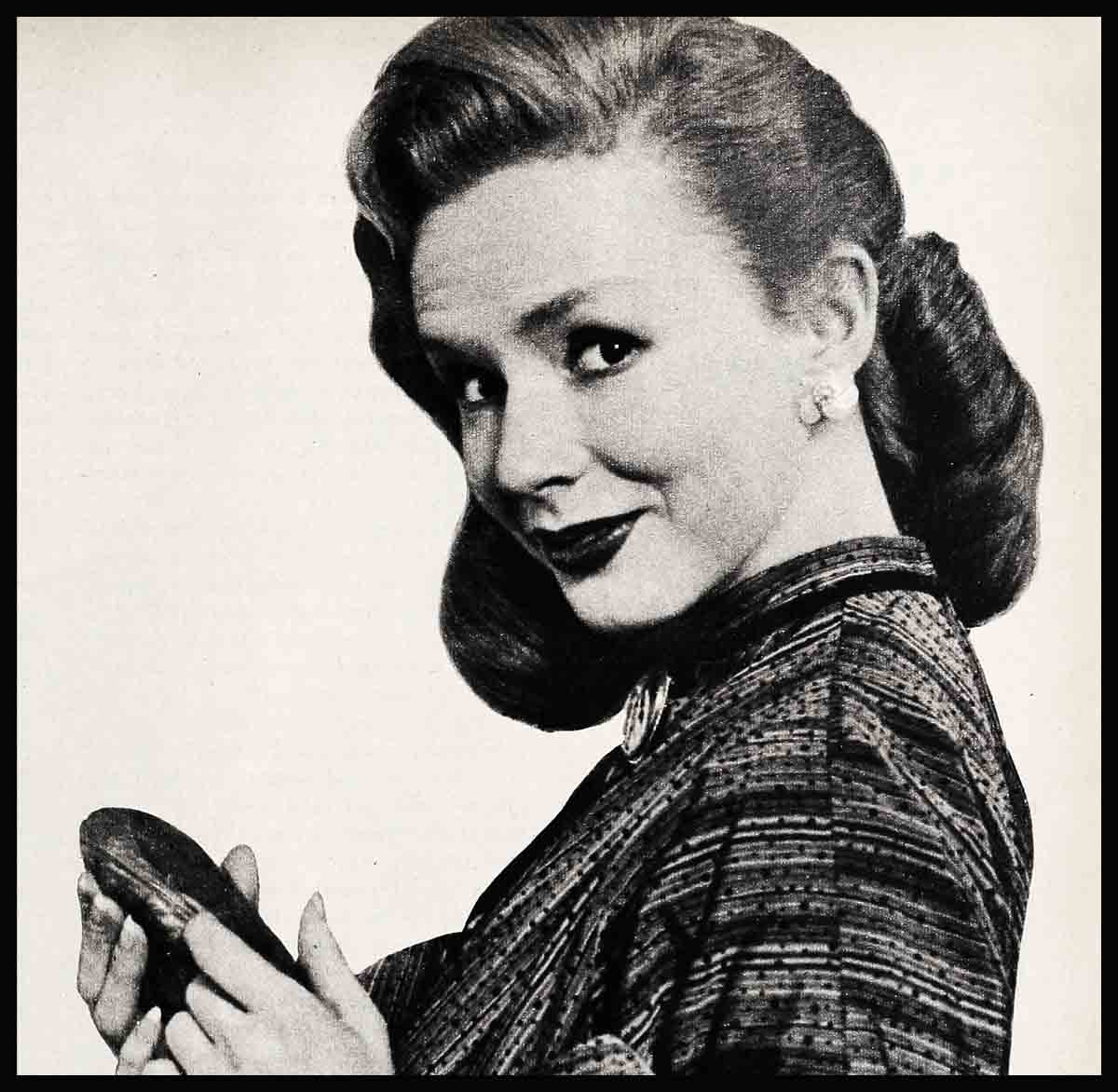
The Men In Her Life—Piper Laurie
Piper Laurie had her long red hair tied up neatly in a ribbon. She had just finished recording her first song for “Ain’t Misbehavin’ ”—which, incidentally, is her first musical, too—and life seemed touched with happiness and magic.
That she was finally an established actress was no startling disclosure. For years, Hollywood talent-tellers were predicting that Rosetta Jacobs, now Piper Laurie of the flower-eating fame, was riding to stardom. The part that interested gossip gloaters was the last comment. “I could never have done it alone.” Who was the one? Rumors buzzed. “I always knew it,” gossips wagged. “Such a beautiful girl remaining single? She’s probably been secretly wed for years.” “You rarely see her hitting the night spots,” came back a second guesser. “Notice how she stays away from column gossip?” There must be a man in Piper Laurie’s life was the final consensus of opinion. But who? Piper wasn’t talking though—not until one afternoon recently. What made her open up? Who knows, maybe the gossipers. Anyway, this is the way Piper explains it.
“I have no idea what I’d be now if it weren’t for the various men who have done so much for me,” she said, smiling gently. Basically a shy person, Piper speaks softly, but there is about her a sparkle.
“As I look back on it now, my Uncle Morris was probably the first to help me put my dreams into action,” Piper said. “He was my father’s youngest brother—and he was the comedian of the family. Everybody used to love to have him come for a visit. He and I were both hams—we loved being on center stage, so we used to put on shows for the family. We’d get out the kitchen ladder and I’d stand on top of it—using it as the stage. I’d sing and he’d tell jokes and wear funny hats. I was five years old then.
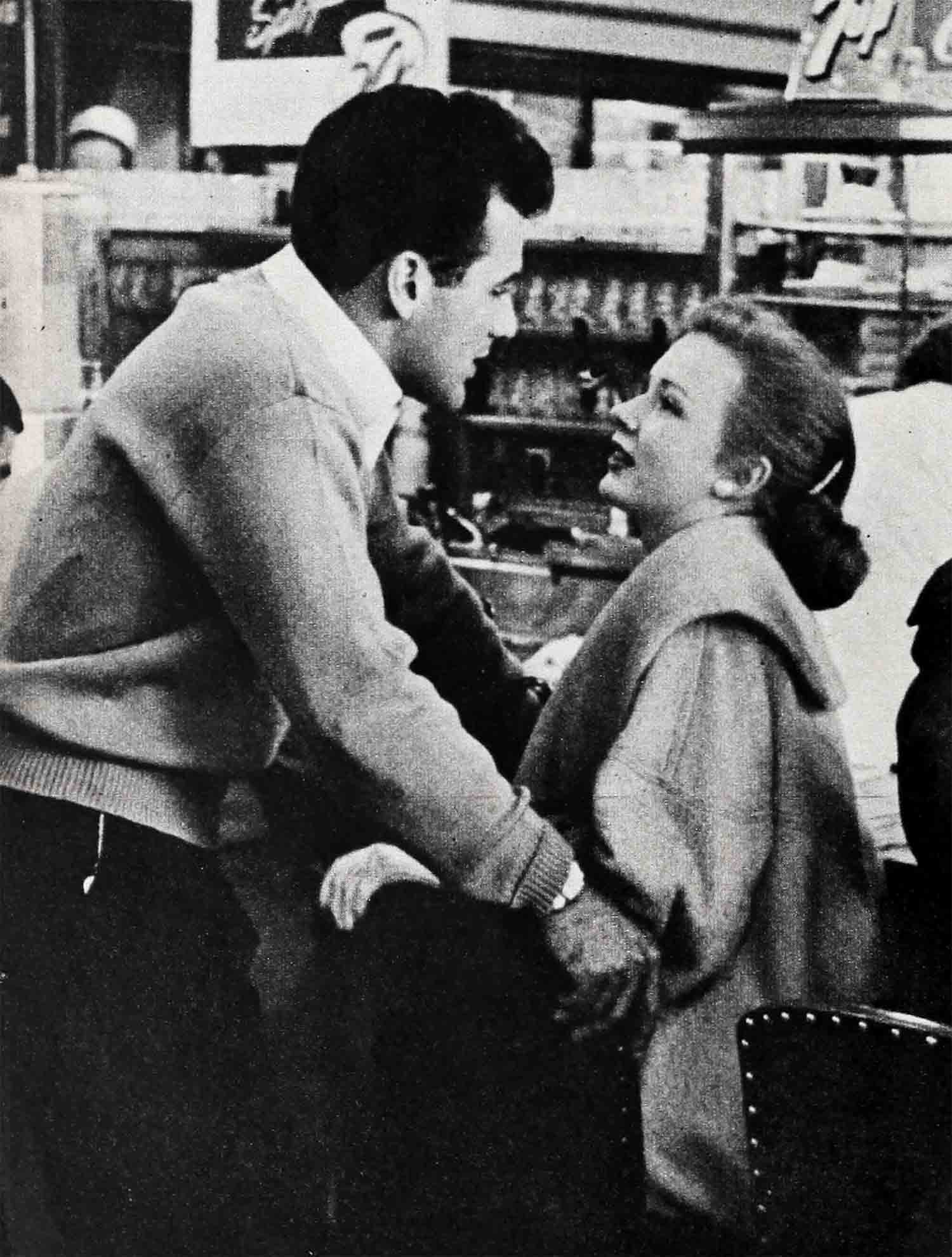
“Uncle Morris is now in New York, but he gets a big kick out of my career. I think he was the first to guide me towards a life as a motion-picture actress.
“It was around this time that I was influenced by another man, a movie star—and I’ve even forgotten his name. He made a personal appearance in a theatre and I saw him. He was the embodiment of all I hoped, deep inside, I would become someday.”
In Piper’s immediate family, her father naturally had great influence on her. Something he said once to her hurt her deeply—and yet she isn’t sure even now if that incident wasn’t the one thing that actually started her on her career.
“It all happened when I first began studying to be an actress,” Piper commented quietly as her mind retraced the details of the moment. “I was taking my father’s hard-earned money and was living in my own little world of make-believe. He used to watch me and wonder what I was coming to. It was odd to him that I should want to be an actress. Nobody in our family ever had such inclinations. He said, ‘I think you’re foolish to try to be an actress. I don’t think you have what it takes.’ This hurt me terribly—and yet it made me mad. But looking back on it, I’m not at all sure that this didn’t make me prove to father I could be a success as an actress. Before then I had been living in a kind of dreamworld. He woke me up fast.
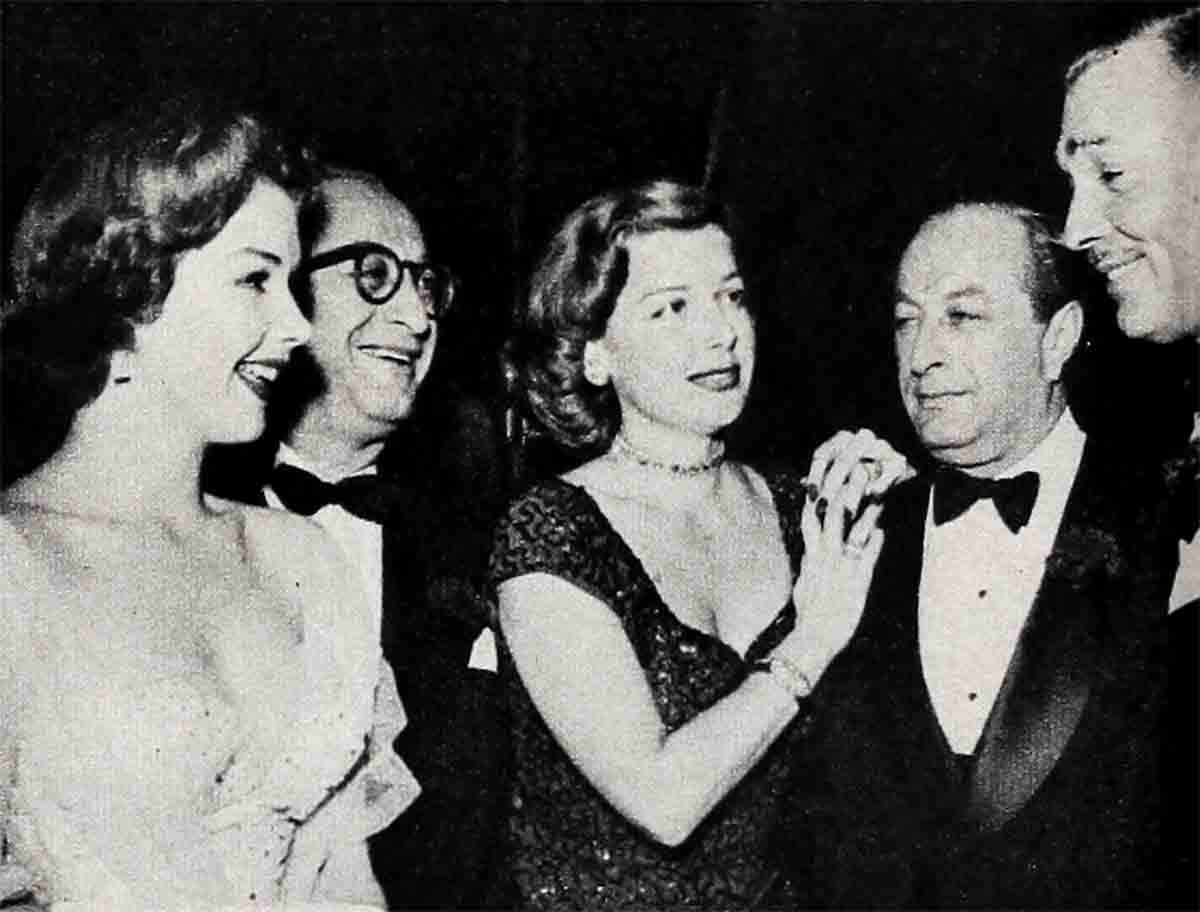
“My father is the strongest influence I’ve had in my life—for that one thing he said and for other reasons. Yet, now when I think of him, I realize how little any young person is aware of what a father teaches her. You kind of think of a father as someone who is gone from the house all day, who comes in at night, has dinner, says a few words to you, gets his paper, and then kisses you good night. And yet I know that all of the basic ideals I live by stem from my father’s wisdom. He is one of the most honest and straightforward men I’ve ever known. I don’t even remember his telling so much as a white lie. I always try to be as truthful and as honest as he is.
“My father never coddled me or treated me like a china doll. He is a strict disciplinarian. I think his means of discipline gave me a sense of values I would never have had otherwise. His ways of showing me how to discipline myself have helped me to take whatever success I may have attained and not let it throw me. Even now, if I ever get carried away, he’s there to level me off.
“I had my share of spankings, but I never regretted any. I can’t ever recall once being spanked when I thought I was being unjustly punished.
“Father was very particular about my health habits, too. There was always quite a routine before dinner. I’d come to the table, he’d inspect my hands to see if they were clean and, if they weren’t, he’d escort me into the bathroom and stand over me while I washed. He was also particular about my eating the right foods—which has helped me to be conscious of proper diet and health even now. It wasn’t that he’d force me to eat anything. He’d kid me into eating. I remember how I detested Brussels sprouts. One day I said to my father, ‘But they look just like small cabbages—like something was wrong with them.’ He laughed and said they were delicacies because they were so small. When it came to carrots, another food I could do without, he’d say, “They’ll keep your hair red.’ I eat practically everything now.
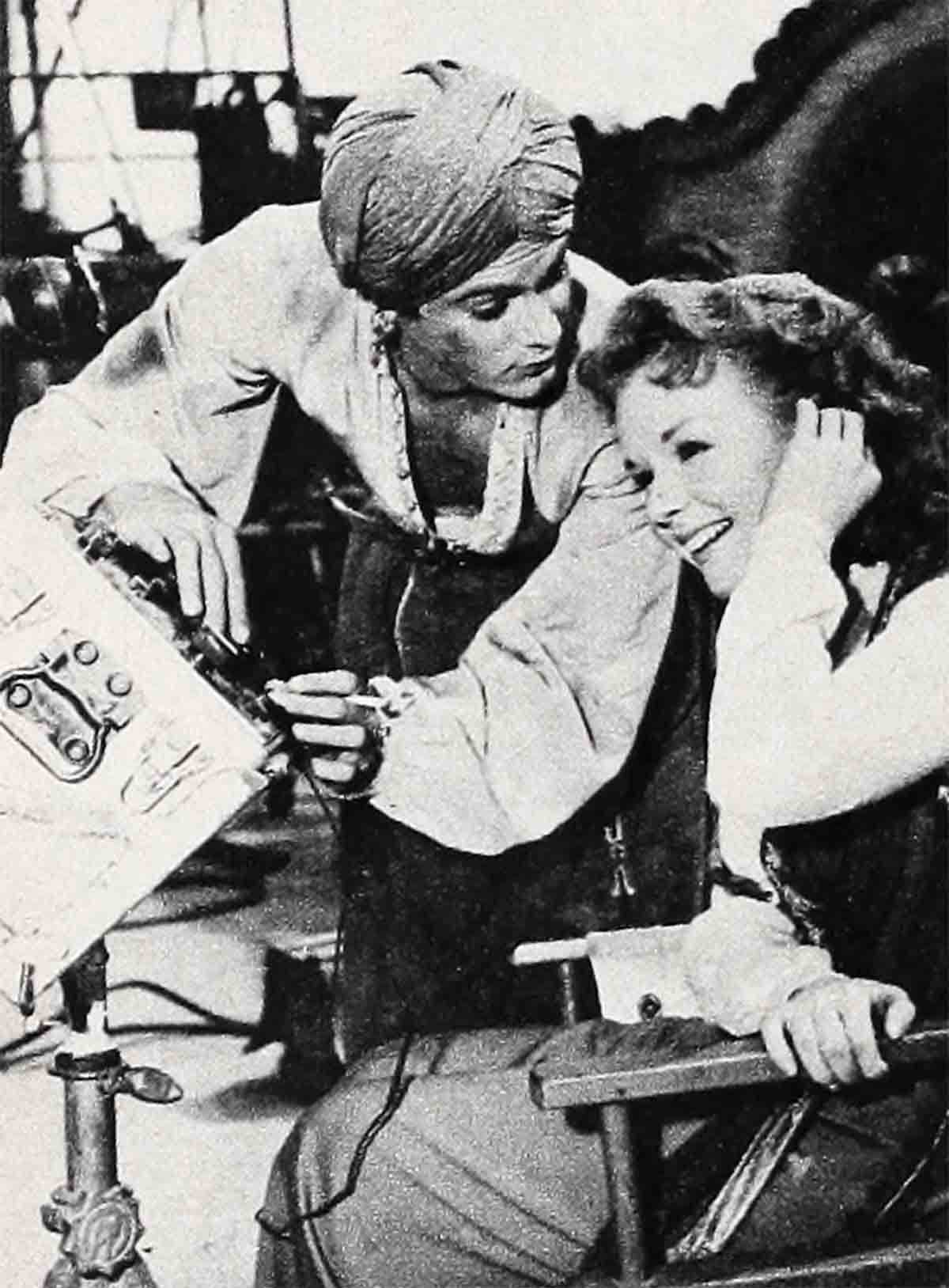
“I hope I have acquired most of my father’s ideal habits—his sense of humor, his genuine kindness, his great patience. I watch him today with real love. Here is a man with a tremendous devotion to his family. I hope to be as successful in marriage as he has been in his.
“Dad has talked to me at times about what to expect from marriage. He has set up no lofty ideals for me to follow. He has only said, ‘I hope you will find someone who will be kind to you—and, above all, who will love you very much and someone whom you will love.’ ”
From the time Piper started to school, there was one pattern throughout her life—a very real fight to gain self-confidence, to overcome her shyness. She tried to do everything well because she loved, as do all children, approval. She has never forgotten the first complete approval she was given. It was from the athletic director at the school she attended in Tujunga, California.
“His name was Frank,” Piper began. “He was a big man, a giant of a man. He taught me swimming—but with these lessons he also taught me the importance of taking care of myself physically and mentally.
“I can never forget him because he was the first person to put a challenge in front of me and help me meet it. I learned to swim in just two days, and I can still remember how proud I was about this, how confident I felt. I was especially proud because the other kids hadn’t learned as quickly. I was about seven at the time—and it was my first lesson in learning how not to be afraid. Frank purposely made me swim in the water alone and I had absolutely no fear.
“But then he taught me something else. One day I was feeling a little cocky. He quickly assured me I was just beginning, that I didn’t know it all, and that there was much I had to accomplish. I think from this I have learned never to be too satisfied with anything I do, but to look ahead to the next challenge.

“There was a boy named David, too,” Piper said quietly. “I can’t ever forget the day he kissed me—on the cheek. Oh, I was so upset! I was sure I had been ruined for life. I just ran away from him. I had never played with boys very much and this only convinced me that I couldn’t get along with them.
“And then there was another boy, whose name I don’t remember, who taught me that there is a kindness in all people. It was a little incident. It’s odd I still remember it. But I was picking some flowers outside the school garden one day and I cut my finger. It began to bleed and this little boy came by and gave me his handkerchief. Even now I can recall that warm glow I felt inside because of this gesture.
“But this didn’t change my attitude towards boys. They still continued to be a mystery to me—an awesome mystery.
“There was one boy named Irving Le-bow who was very obvious in letting me know he loved me. We were both quite young—eleven years old to be exact. I just ignored him—and made faces at him. But he made a big thing out of his love for me. When I had to walk up in front of the class to recite, he’d sigh heavily and carry on in what seemed, to me, a ridiculous way. I told Mother one day, ‘Oh, that Irving is just too silly. I can’t stand him. To which mother said with a smile, ‘But all children are silly—and they all do change.’ This would not convince me. I reiterated firmly, ‘But I can’t help it—he’s too silly for me.’
“When our classbooks came out—our annuals—all the kids wrote sentimental and not-so-sentimental things in them. I can still remember what someone wrote in mine: ‘If Rosetta lived across the sea, what a great swimmer Irving would be.’ All this embarrassed me.
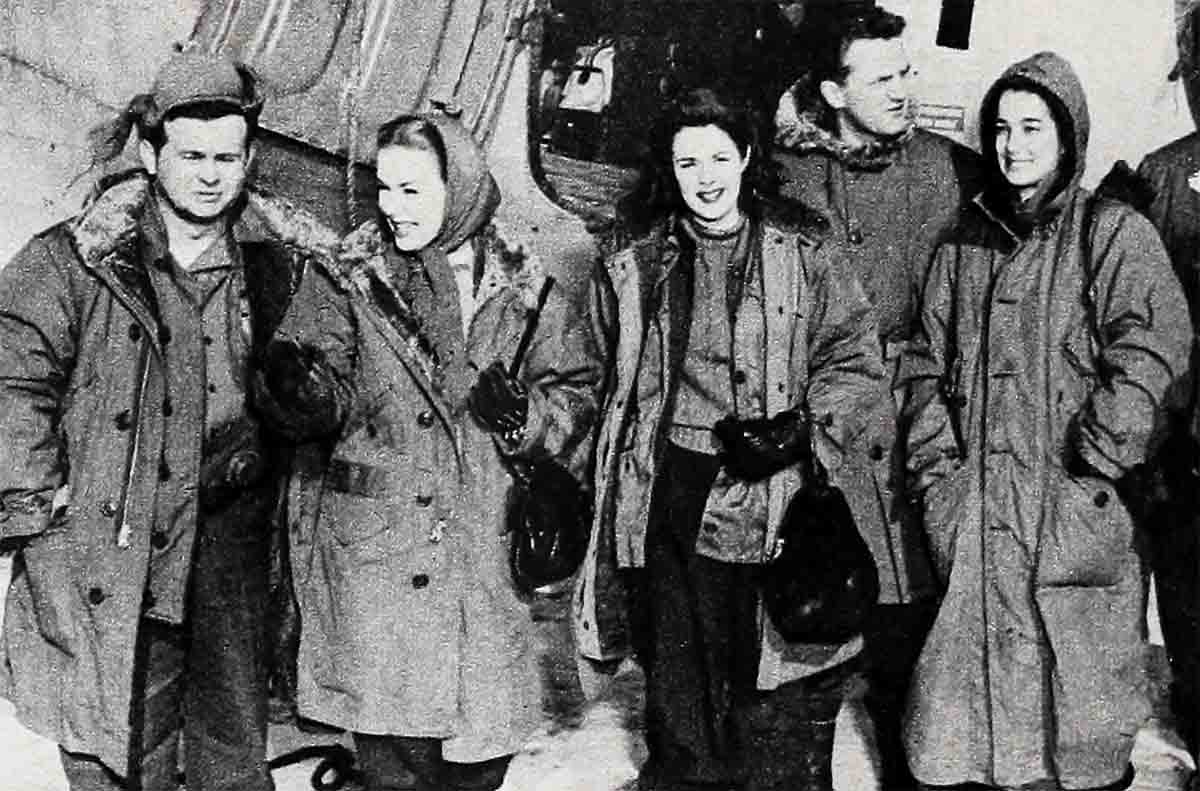
“And yet I did a strange thing several times. I’d purposely walk past Irving’s house on the way to Sunday school. I could easily have avoided him, but for some reason, I didn’t want to. It intrigued me to saunter past his place. He came out one day with a bag in his hands. Very quietly he said, ‘Excuse me, Rosetta, but here are some cookies for you.’ He smiled shyly and just stared at me. I was very excited, but I acted blasé and indifferent about it all.
“So how did Irving influence me? Well, I guess he was the first to make me aware that I could enjoy the attentions of young men. Otherwise—why did I walk past his house?
“Perhaps I was also beginning to be the perverse female. I liked the attention of young men, but I still avoided them. When I’d go to dances I’d always stay with the girls. Oh, I’d dance with a boy, but I’d not really enjoy it.
“I didn’t realize that men could be friends until I went to the Schneider Dramatic Class. There I met Don Oreck and Bob Richards. We had mutual interests, there was no romance involved and I enjoyed being with them. We’d often go to movies together—and, of course, we were talking acting all the time. Maybe I felt at ease with them because I knew there was no romantic attachment and, I suppose, I just was afraid then of such serious things as love.
“I gained no idea about the kind of man I’d like to marry from any of the boys in school, but I did learn something from a businessman I met. He played piano very well—and his whole family was quite musical. I was very impressed with him—and thought how nice it would be to be married to a talented man.” Piper laughed lightly and said, “For that matter, I’d still like to marry a talented man.”
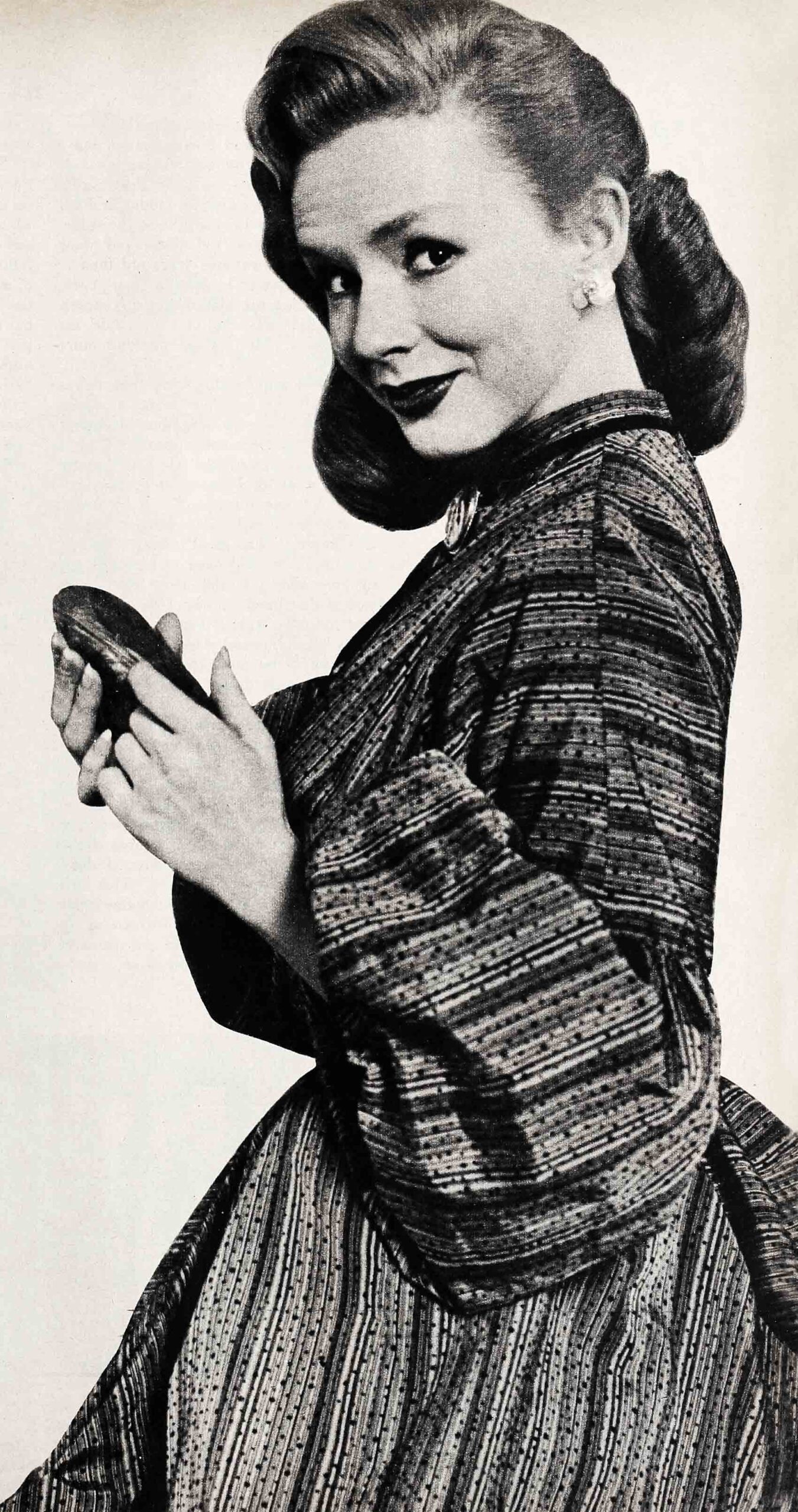
It was another older man who gave Piper confidence and who taught her an important lesson. He was the art teacher at the school she attended.
“This man, his name was Major something or other,” Piper said, with a happy chuckle, “was quite a character. He taught girls judo in-between the art classes. He was, however, very artistic and was especially interested in my work in class. He encouraged me even though I hadn’t felt I was doing so well as a painter. But it was what he said to me one day that left a lasting impression on me.
“I had come into class with my long hair tied up neatly with a ribbon and I had on one of my few good dresses. The Major told the class how nice I looked and said that artistic people had more clothes sense.
“ ‘Piper’s artistic ability shows in the way she dresses,’ he added.
“This was the first time I was ever complimented for my appearance—and it was something I’ve never forgotten. To this day I always try to look neat and clean. I hadn’t thought so much about appearance before that.”
Again there is that same pattern—the influence of older men. It was a very elderly man, in fact, who gave Piper one of her most important lessons.
When you’re young and climb up that shaky ladder of fame, there is a tendency to become self-centered, to think only of the next big part, the next raise in salary. Material things can become all-important. Piper has never placed undue emphasis on possessions. She has learned instead what was important from life from this older man, a cowboy whose name is John McNamara.
“John McNamara used to be a black-smith on the desert,” Piper remarked with honest affection. “He now works on a guest ranch where his primary duty is taking care of horses.
“I was twelve when I met him the first time. He was not a very sociable person, but he seemed to like me and we’d go horseback riding together. We used to—and still do—ride up to the top of a mountain. We’d talk about all kinds of things and then he’d wander off by himself and let me sit alone.
“The first time we rode there, I got a terrific feeling of contentment. It was a thrilling experience to be on top of that mountain—alone. I felt so free. I looked at the sky, the tiny dots below which were houses, I drew in deep breaths of the fresh air. I felt as though I weren’t really alive. It was more like floating in space. This was a new world to me and it’s a world I like to escape to even now when I get pressed in by too much tension. I learned from John how to pace my life, how to enjoy the world in which I live and how little it takes to have real contentment. No one can buy this kind of peace—it is free for those who want to take it.”
The experience also helped to give Piper a sense of values—and this was something she needed once she found herself wrapped up in the hectic whirl of ad a a motion-picture studio. When she signed her contract at Universal-International, many things changed for her.
Here, again, was a turning point, but it was one Piper met gracefully, primarily because of the help of a star she knew.
I wasn’t interested much in dating when I made my first picture,” Piper commented, “but I certainly won’t forget one big date I had at the time. It was arranged partly by the studio and was partly a personal kind of thing. My date was Ronald Reagan!
“I was tremendously impressed by Ronnie. I kept saying to myself, ‘I’m going out with an actual movie star!’ I was trying so hard to be very adult that night. Ronnie and I were going to the Brown Derby for dinner where we were to have some publicity pictures taken and then we were to go to a premiere.
“When we got to the Derby, Ronnie helped me out of the car—and then it happened. There was a partition in the driveway which I hadn’t seen. I stumbled and fell flat on my face. I tore my stocking, gashed my dress. When Ronnie helped me up, I tried desperately to regain my composure—but I had a difficult time. I managed to get myself repaired and then I walked into the restaurant with as much dignity as I could—in spite of a knee that was hurting and a somewhat disheveled appearance.
“The date was memorable for something else, though. Ronnie told me that night how foolish it was for young starlets to be a gossip-column movie star. He reminded me that the most important thing was to be a good actress and that there were decided disadvantages to having your name in the paper all of the time. At one time I was impressed by reading all the names in gossip columns, so I listened to him carefully. I don’t think I’ve ever forgotten what he said. I know I’ve never received a part or a good review by being seen in a gossip column.
“Ronnie, however, wasn’t the first movie star I’d met. I knew Tony Curtis before I got in pictures. Tony used to come by my house and he and I had a few dates. I had before assumed that all movie people were on another plane, that they rested cozily on some unreachable pedestal. Tony taught me not to believe all I read about stars—that they were just human beings with problems. He was so unpretentious, so unimpressed with the progress he had made and so genuine that when I did get into pictures, I wasn’t so inclined to view each star with that breathless wonder. I didn’t endow them with custom-made halos.
“Through Ronnie and Tony I began my bows and special effects motion-picture career on a more sensible and practical basis. I learned acting wasn’t glamour—it was hard work. And it made no concessions to phony attitudes.”
When Piper got her contract, she met one man who not only helped to give her confidence in herself but who became her closest friend. Leonard Goldstein died suddenly last year, but Piper will always remember him in her heart.
“I met Leonard before I signed at Universal-International,” Piper said softly. “I was testing for a part at the time and was taken in to see Leonard, who was a producer at the studio. I was really scared. He was so gruff and abrupt and after shaking hands with me he kept holding onto my hand. I recall his telling me to sit down, but I couldn’t sit too gracefully with him hanging onto my hand. I finally did sit down—and then Leonard just stared at me. This made me feel all the more nervous. Finally, my agent started to laugh and so did Leonard. It seems that the gruffness and the abrupt manner were only a pose Leonard put on.
“When I left I had to ask my agent what Leonard’s name was. I was so nervous I couldn’t remember.
“I saw him again when I was making my second picture on the lot. A little later, the contract players at the studio did scenes from plays as a showcase for producers. I did a part in one of the plays and Leonard came back to see me afterwards. He shook my hand this time and said how good I was. But it was the way he said it that impressed me. I knew he wasn’t making polite backstage talk.
“A little later I went on a tour and, while I was away, I got a wire asking me to come right back to test for a big picture with Tony. Leonard was to produce it. Well, I got the part and, from the beginning, Leonard was constantly on the set bolstering Tony and me when we needed it and giving us encouragement.
“Rudy Mate, the director, was helpful, too. One scene, my first appearance in the picture—although it was shot last—bothered me. I didn’t feel right in it and Rudy noticed how ill at ease I was, so he asked me how Id like to do it. I explained my idea, never thinking he’d pay much attention. He not only listened, but he let me do the scene my way. This was the first recognition I had had as an actress—and it meant so much to me.
“By the time the picture was finished Leonard and I were good friends. By everything he said—especially his criticisms—I knew he believed in me. Before I had been unsure of myself in pictures, I was working under pressure, trying so hard to prove something. Now, with Leonard’s confidence, I began to relax and enjoy what I was doing. And I found myself turning to him more and more for advice. One bit of advice he gave me, though, was hard to take.
“Tony and I both heard that the picture was being sneaked one night, and naturally we wanted to go, but Leonard advised us not to be at the theatre because of the studio policy about stars’ showing up at sneaks. To be sure I didn’t go, he had a friend of his take me out to dinner. I was so nervous all during dinner I could hardly eat. After the preview we went to Romanoff’s where a kind of party was given for those in the picture.
“There are many things Leonard did for me—but all I can say is that I’ll never again have such a wonderful friend. No matter what I say about him now, it’s not enough. It even seems trite. And yet every day something happens and I react to it according to the lessons Leonard taught me. How lucky I am to have known him.
“So what had Leonard taught me? I learned so much from his wisdom. I gained strength from him—and a spiritual awakening. He showed me the strength to be gained from a complete belief in God’s power, from the knowledge that through God all good things are possible. Leonard’s faith in spiritual matters was the simple kind. It was not dogmatic or full of platitudes. It was the practicing kind of belief in a Power greater than ourselves.
“Things used to upset me. Once I was bothered by a problem at the studio. I knew I’d have to go in to see the head of the studio and I was so afraid to take the step. I fretted and fussed over it for a long time. But now, I can go see anyone about any problem because, through Leonard, I learned that with the power God has given us all and with the compassion He has for our feelings, I need have no fear of anyone—especially of myself.
“I learned, too, about show business from Leonard. I used to go to his place every Sunday morning for ‘brunch’ parties. Many top stars would be there, but I’d get upset because I felt I didn’t belong in such important company. I told him one day coming back from his beach home that I didn’t want to go to any more of the parties.
“ ‘But you should go,’ Leonard told me. ‘You have to meet these people because you’re in the same business now.’
“ ‘But they scare me,’ I told him.
“ ‘Then the only way to get used to them is to be with them,’ he said firmly.
“And he was right. I got over this fear by forcing myself to go.
“Then there was the time he said something else to me that reminded me of the comment my art teacher had made. He was discussing young players and how wrong he felt it was for some of them to be seen in public and at the studio not looking their best. He said he admired me because I was well-groomed and because, above all, I had good posture. This meant something coming from Leonard because he wasn’t one to be free with his compliments.
“But the biggest lesson he taught me was his death. His being gone has underlined everything he ever said to me. Since he died I have gained a new perspective just because I knew him. Lots of things I once thought were important are now so unimportant I can laugh at them.
“I learned when Leonard died that when you lose someone you loved all other things take on new meanings. Material possessions are suddenly completely un-important. I could have no richer treasure than that of knowing Leonard. His death made me look into myself and to try to be all the things he believed I was.”
Death taught Piper another lesson. When she was in Korea some time back on a tour entertaining the troops, she had an experience that has left its mark on her. She sat up all night talking to a GI who was dying. The boy actually died as she held his hand. For months Piper couldn’t shake that memory. It was a shattering thing—and yet an important lesson.
“When you see someone die, you’re taken out of yourself,” Piper said so quietly you could hardly hear her. “You realize how dependent you are upon others and how much better it is to think of what you can do for someone else than to gratify your own personal whims. I can still see that boy’s face. He knew he was dying and yet he was so grateful to me because I sat there with him and talked to him. Grateful to me! It is I who am grateful because I learned the true meaning of unselfishness from him.
“His mother recently sent me a beautiful gift for my birthday—a set of bath towels, hand towels and face cloths she had made herself.”
The death of Leonard Goldstein and that GI have made Piper a much more mature, thinking person. She stopped being just a young movie actress, and she became a young woman with a purpose in life.
Piper never takes anything for granted now, and she never stops being grateful for all that has come to her. The process of learning to believe in herself is still going on, but she is making progress. She has found so much to strive for, so many obstacles to hurdle, so many things to prove—and she’s glad for each new challenge. Just recently she took a big step—and another man came into her life.
“I knew I had to sing in ‘Ain’t Misbehavin,” Piper remarked. “All my life I’d wanted to be able to sing, but I was afraid to open my mouth. I was afraid even to hum. I’d start to sing and nothing would come out. But when I was assigned to the picture I faced the fact that I would have to sing. I didn’t even think of finding an excuse to get out of it. I just went to Johnny Scott, a vocal teacher. He was very understanding and patient and, because of him, I was able to gain the necessary confidence and actually to sing my own numbers in the picture. I intend to continue my studies, too.”
As you may have noted, romantic experiences have been few and far between in Piper’s life. No romance has apparently influenced her. And yet what about Dick Contino and David Schine, with whom she has been paired in gossip columns?
“Dick did—and still does—have an influence on me, but contrary to all reports this has been a real friendship rather than a romance,” Piper remarked sincerely. “I know that sounds trite and perhaps there will be those who won’t believe it.
“Dick has been important in my life for several reasons—the biggest that I was given an opportunity to be a real friend for one of the first times in my life. When Dick was having his troubles, it was a very gratifying and wonderful experience to feel I was needed and that I could help. Again, it was learning the value of thinking of someone else instead of myself. Dick has been just as good a friend to me in many instances. After Leonard passed away, Dick was in Las Vegas playing at one of the clubs, but he immediately sent for me and my family to join him. He wanted to help me over this rough emotional experience, to get my mind on something else. This was the kind of gesture only a real friend would make.”
Piper summed up everything with “All these men have changed me. All are responsible for what I am as an actress and as a person. I am so lucky that they were the kind of people they were because otherwise I might have had influences that would have steered my life in an entirely different direction. They actually gave me a life.”
THE END
—BY JACK HOLLAND
It is a quote. PHOTOPLAY MAGAZINE NOVEMBER 1955




